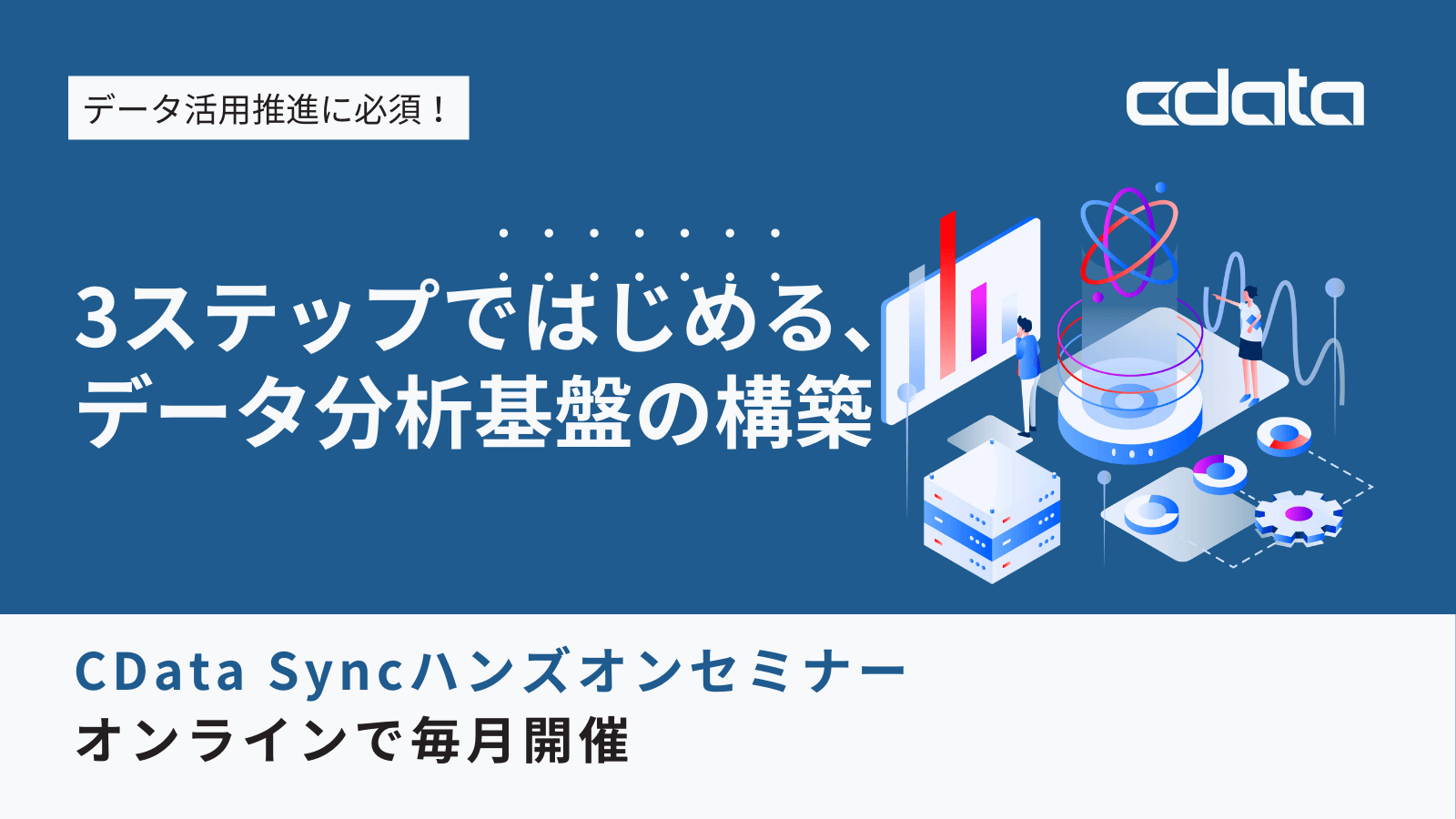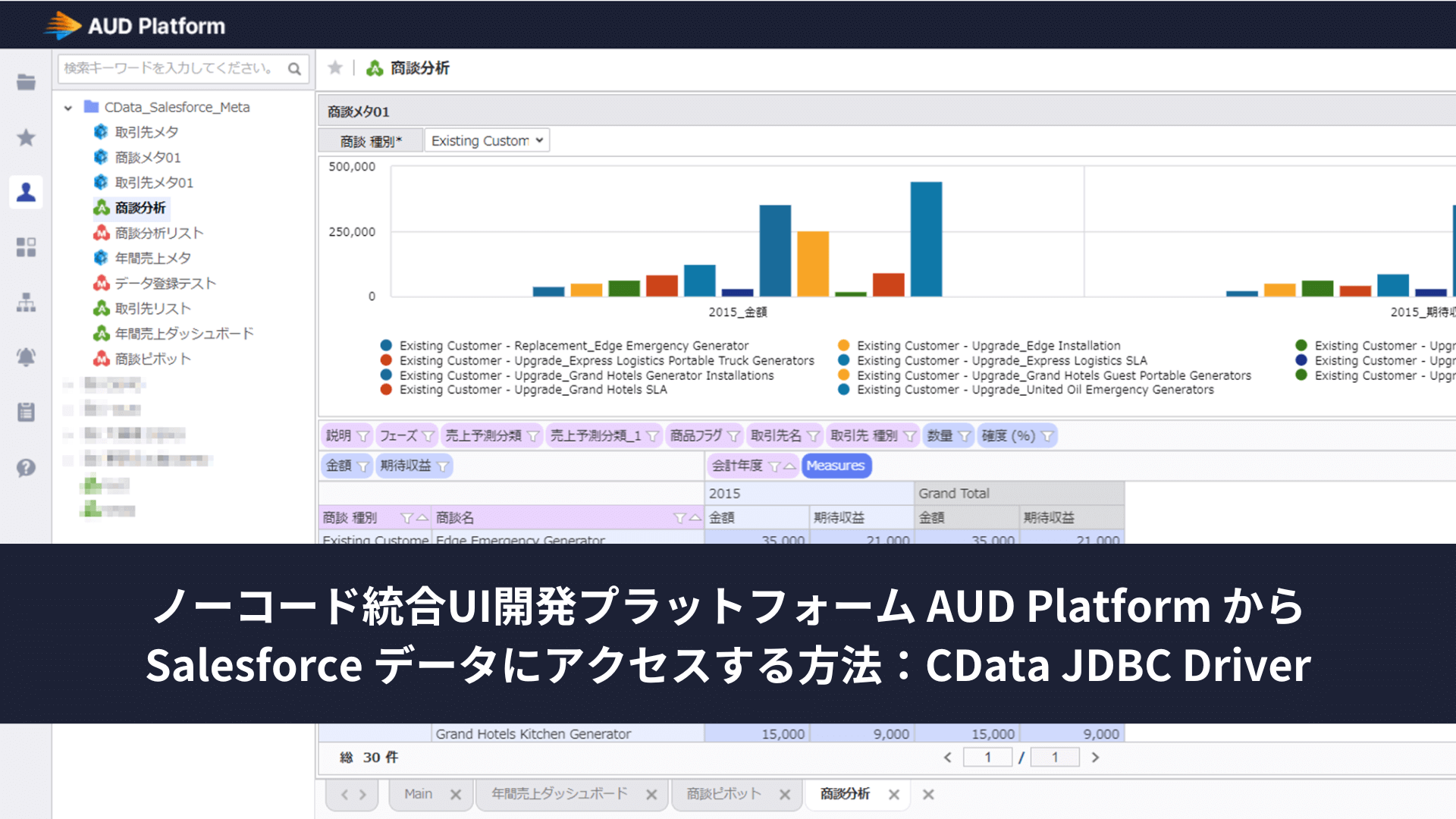ノーコードでクラウド上のデータとの連携を実現。
詳細はこちら →CData Software Japan - ナレッジベース
Latest Articles
- MySQL のデータをノーコードでREST API として公開する方法:CData API Server
- CData Sync AMI をAmazon Web Services(AWS)で起動
- Connect Cloud Guide: Derived Views, Saved Queries, and Custom Reports
- Connect Cloud Guide: SSO (Single Sign-On) and User-Defined Credentials
- Connect Cloud クイックスタート
- Shopify APIのバージョンアップに伴う弊社製品の対応について
Latest KB Entries
- DBAmp: Serial Number Expiration Date Shows 1999 or Expired
- CData Drivers のライセンスについて
- Spring4Shell に関する概要
- Update Required: HubSpot Connectivity
- CData Sync で差分更新を設定
- Apache Log4j2 Overview
ODBC Drivers
- [ article ] 業務アプリ構築ツールコンテキサーで、Zoho CRM と連携したアプリを作成する方法
- [ article ] DBArtisan でMySQL データに連携
- [ article ] DBArtisan でTrello データに連携
- [ article ] Microsoft Access リンクテーブルからSAP Concur データに接続・更新する方法
JDBC Drivers
- [ article ] NetBeans IDE でNetSuite データに仮想RDB として連携
- [ article ] Apache Spark でスマレジ データをSQL で操作する方法
- [ article ] JDBI からMicrosoft OneDrive のデータアクセスオブジェクトを作成
- [ article ] ソフトウェア開発ツールMZ Platform でFacebook Ads データと連携
SSIS Components
- [ article ] Confluence をSSIS 経由でSQL サーバーにバックアップする
- [ article ] BigQuery をSSIS 経由でSQL サーバーにバックアップする
- [ article ] Monday.com をSSIS 経由でSQL サーバーにバックアップする
- [ article ] SSIS を使ってKintone データをSQL Server にインポート
ADO.NET Providers
- [ article ] Entity Framework 6 からMYOB AccountRight データに連携
- [ article ] Google Data Catalog データを使ったCrystal Reports を発行
- [ article ] SSIS を使ってSAP ByDesign データをSQL Server にインポート
- [ article ] 生産スケジューラFLEXSCHE へTableau CRM Analytics からデータを取り込む
Excel Add-Ins
- [ article ] CDATAQUERY 関数を使って、Excel スプレッドシートにGoogle Search ...
- [ article ] Microsoft Power BI Designer でCData Software ODBC ...
- [ article ] Mac OS X 上のMS Excel でZoho Creator データを連携利用
- [ article ] Microsoft Access リンクテーブルからSharePoint Excel ...
API Server
- [ article ] Oracle Data Integrator でOData のデータをETL する方法
- [ article ] OData のデータをTableau Desktop ...
- [ article ] Infragistics XamDataGrid を使用してOData のダイナミックグリッドを作成
- [ article ] LINQPad でOData データを操作する方法
Data Sync
- [ article ] Vertica へのSnapchat Ads データのETL/ELT ...
- [ article ] KARTE Datahub からRSS にある顧客情報をCData Sync 経由で利用する方法
- [ article ] Oracle データベースへのReckon Accounts Hosted データのETL/ELT ...
- [ article ] Amazon S3 へのGraphQL データのETL/ELT ...
Windows PowerShell
- [ article ] MongoDB データをPowerShell でMySQL にレプリケーションする方法
- [ article ] Dynamics 365 データをPowerShell script でSQL Server ...
- [ article ] Exact Online データをPowerShell でMySQL にレプリケーションする方法
- [ article ] PowerShell からHubSpot データに接続してデータの取得・更新・挿入・削除・CSV ...
FireDAC Components
- [ article ] Delphi のSansan データへのデータバインドコントロール
- [ article ] Delphi のOdoo データへのデータバインドコントロール
- [ article ] Delphi のSalesforce Pardot データへのデータバインドコントロール
- [ article ] Delphi のNetSuite データへのデータバインドコントロール





